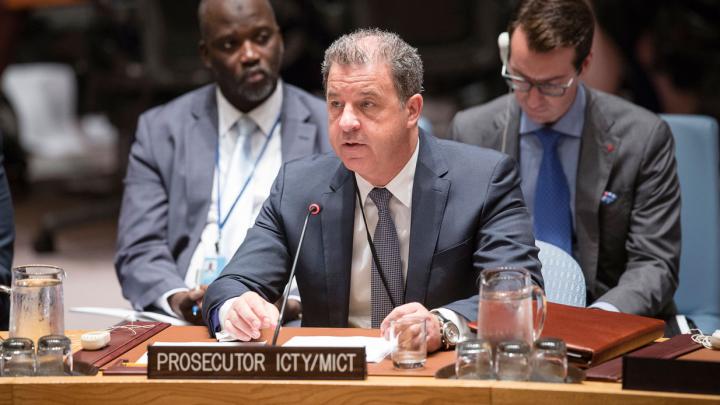MICT Progress Report: Prosecutor Serge Brammertz Addresses the United Nations Security Council
The Prosecutor of the Mechanism for International Criminal Tribunals (MICT), Mr Serge Brammertz, presented today the Office of the Prosecutor’s (OTP) 8th progress report to the United Nations Security Council (UNSC), covering the period from 16 November 2015 to 15 May 2016. The Prosecutor updated the UNSC on MICT trials and appeals, ICTR cases referred to national courts and efforts to locate and arrest the remaining eight ICTR fugitives.
Regarding MICT activities in The Hague, the Prosecutor began his remarks by informing the Security Council that pre-trial proceedings have commenced before the MICT in the Stanišić and Simatović case, and that the appeal proceedings have commenced in two MICT cases, Karadžić and Šešelj. Prosecutor Brammertz noted that consistent with the Security Council’s directions, the MICT OTP has utilized “double-hatting” and roster arrangements in order to ensure that the transition of responsibilities from the ICTY is smooth and cost-efficient.
Turning to MICT activities in Arusha, the Prosecutor commended the Rwandan National Public Prosecution Authority for its work on the Uwinkindi case referred to Rwanda. The trial judgement, delivered on 30 December 2015, convicted the accused and sentenced him to life imprisonment. Speaking about the two cases referred to France, the Prosecutor stated that the OTP would continue to liaise with French authorities and “encourage the expeditious completion of these cases.”
Prosecutor Brammertz then emphasized, “The MICT OTP is also firmly focused on locating and securing the arrests of the remaining eight fugitives indicted by the ICTR.” The Prosecutor noted that state cooperation and the Security Council’s support remain essential to locating and arresting fugitives.
The Prosecutor further raised the issue of genocide denial with the Security Council. He emphasized, “The truth of what happened during the Rwandan genocide has been repeatedly established in the ICTR’s judgements,” but noted that “today, genocide denial continues.” Prosecutor Brammertz further emphasized, “To safeguard future generations, it is essential that there is education about the dangers of genocide ideology and discrimination,” and urged “all States to actively promote the truth and stand against revisionism in all its forms.”
Prosecutor Brammertz concluded by confirming that the transition of responsibilities from the ICTY to the MICT continues as foreseen in Security Council resolutions. He further stated that the OTP will continue to monitor and support national courts prosecuting war crimes committed in the former Yugoslavia and Rwanda, and expressed his conviction that “to support national war crimes justice efforts, it is important that we disseminate our experiences and lessons learned.”

The Prosecutor of the Mechanism for International Criminal Tribunals (MICT), Mr Serge Brammertz, presented today the Office of the Prosecutor’s (OTP) 8th progress report to the United Nations Security Council (UNSC), covering the period from 16 November 2015 to 15 May 2016. The Prosecutor updated the UNSC on MICT trials and appeals, ICTR cases referred to national courts and efforts to locate and arrest the remaining eight ICTR fugitives.
Regarding MICT activities in The Hague, the Prosecutor began his remarks by informing the Security Council that pre-trial proceedings have commenced before the MICT in the Stanišić and Simatović case, and that the appeal proceedings have commenced in two MICT cases, Karadžić and Šešelj. Prosecutor Brammertz noted that consistent with the Security Council’s directions, the MICT OTP has utilized “double-hatting” and roster arrangements in order to ensure that the transition of responsibilities from the ICTY is smooth and cost-efficient.
Turning to MICT activities in Arusha, the Prosecutor commended the Rwandan National Public Prosecution Authority for its work on the Uwinkindi case referred to Rwanda. The trial judgement, delivered on 30 December 2015, convicted the accused and sentenced him to life imprisonment. Speaking about the two cases referred to France, the Prosecutor stated that the OTP would continue to liaise with French authorities and “encourage the expeditious completion of these cases.”
Prosecutor Brammertz then emphasized, “The MICT OTP is also firmly focused on locating and securing the arrests of the remaining eight fugitives indicted by the ICTR.” The Prosecutor noted that state cooperation and the Security Council’s support remain essential to locating and arresting fugitives.
The Prosecutor further raised the issue of genocide denial with the Security Council. He emphasized, “The truth of what happened during the Rwandan genocide has been repeatedly established in the ICTR’s judgements,” but noted that “today, genocide denial continues.” Prosecutor Brammertz further emphasized, “To safeguard future generations, it is essential that there is education about the dangers of genocide ideology and discrimination,” and urged “all States to actively promote the truth and stand against revisionism in all its forms.”
Prosecutor Brammertz concluded by confirming that the transition of responsibilities from the ICTY to the MICT continues as foreseen in Security Council resolutions. He further stated that the OTP will continue to monitor and support national courts prosecuting war crimes committed in the former Yugoslavia and Rwanda, and expressed his conviction that “to support national war crimes justice efforts, it is important that we disseminate our experiences and lessons learned.”